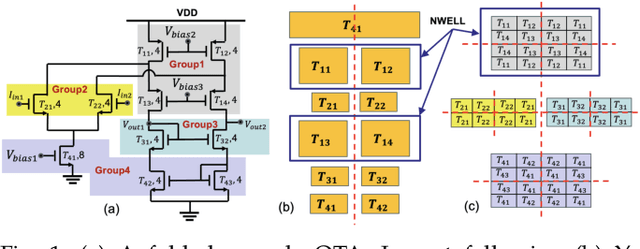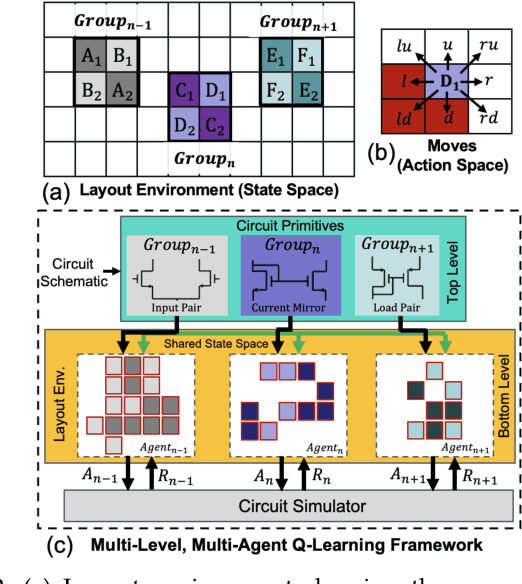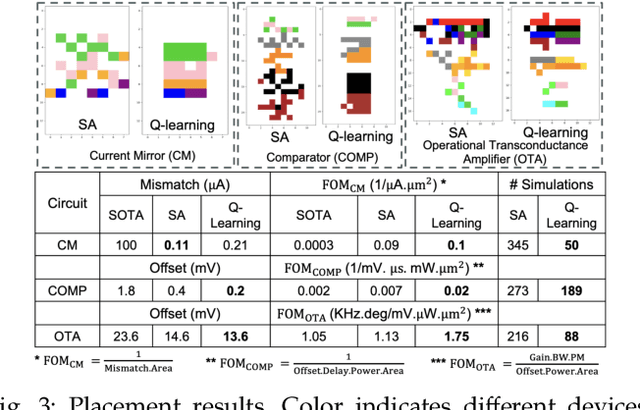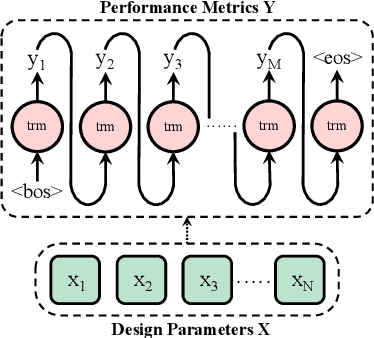Souradip Poddar
Late Breaking Results: Breaking Symmetry- Unconventional Placement of Analog Circuits using Multi-Level Multi-Agent Reinforcement Learning
Mar 29, 2025


Abstract:Layout-dependent effects (LDEs) significantly impact analog circuit performance. Traditionally, designers have relied on symmetric placement of circuit components to mitigate variations caused by LDEs. However, due to non-linear nature of these effects, conventional methods often fall short. We propose an objective-driven, multi-level, multi-agent Q-learning framework to explore unconventional design space of analog layout, opening new avenues for optimizing analog circuit performance. Our approach achieves better variation performance than the state-of-the-art layout techniques. Notably, this is the first application of multi-agent RL in analog layout automation. The proposed approach is compared with non-ML approach based on simulated annealing.
INSIGHT: Universal Neural Simulator for Analog Circuits Harnessing Autoregressive Transformers
Jul 10, 2024



Abstract:Analog front-end design heavily relies on specialized human expertise and costly trial-and-error simulations, which motivated many prior works on analog design automation. However, efficient and effective exploration of the vast and complex design space remains constrained by the time-consuming nature of CPU-based SPICE simulations, making effective design automation a challenging endeavor. In this paper, we introduce INSIGHT, a GPU-powered, technology-independent, effective universal neural simulator in the analog front-end design automation loop. INSIGHT accurately predicts the performance metrics of analog circuits across various technology nodes, significantly reducing inference time. Notably, its autoregressive capabilities enable INSIGHT to accurately predict simulation-costly critical transient specifications leveraging less expensive performance metric information. The low cost and high fidelity feature make INSIGHT a good substitute for standard simulators in analog front-end optimization frameworks. INSIGHT is compatible with any optimization framework, facilitating enhanced design space exploration for sample efficiency through sophisticated offline learning and adaptation techniques. Our experiments demonstrate that INSIGHT-M, a model-based batch reinforcement learning framework that leverages INSIGHT for analog sizing, achieves at least 50X improvement in sample efficiency across circuits. To the best of our knowledge, this marks the first use of autoregressive transformers in analog front-end design.
AnalogCoder: Analog Circuit Design via Training-Free Code Generation
May 23, 2024



Abstract:Analog circuit design is a significant task in modern chip technology, focusing on the selection of component types, connectivity, and parameters to ensure proper circuit functionality. Despite advances made by Large Language Models (LLMs) in digital circuit design, the complexity and scarcity of data in analog circuitry pose significant challenges. To mitigate these issues, we introduce AnalogCoder, the first training-free LLM agent for designing analog circuits through Python code generation. Firstly, AnalogCoder incorporates a feedback-enhanced flow with tailored domain-specific prompts, enabling the automated and self-correcting design of analog circuits with a high success rate. Secondly, it proposes a circuit tool library to archive successful designs as reusable modular sub-circuits, simplifying composite circuit creation. Thirdly, extensive experiments on a benchmark designed to cover a wide range of analog circuit tasks show that AnalogCoder outperforms other LLM-based methods. It has successfully designed 20 circuits, 5 more than standard GPT-4o. We believe AnalogCoder can significantly improve the labor-intensive chip design process, enabling non-experts to design analog circuits efficiently. Codes and the benchmark are provided at https://github.com/anonyanalog/AnalogCoder.
 Add to Chrome
Add to Chrome Add to Firefox
Add to Firefox Add to Edge
Add to Edge